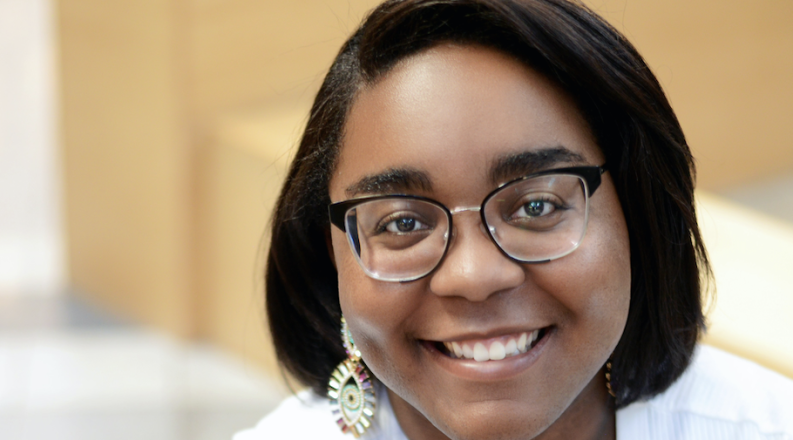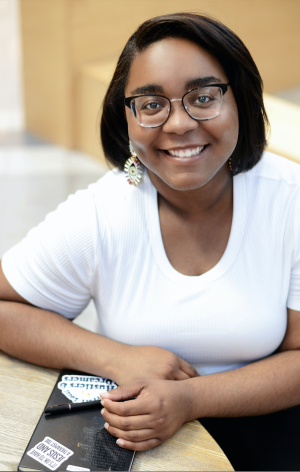Destini Harrell is a city of Virginia Beach native and graduate of Kempsville High School
Graduated from ODU in 2019, majoring in finance with a real estate concentration and communication minor
Graduated from ODU’s Master of Business Administration program in 2021
What brought you to Old Dominion University?
Choosing to attend ODU was one of the greatest decisions I’ve ever made in my life.
When I was looking at schools, ODU wasn’t my ideal because it was at home- it was familiar. I ended up going and my time there provided major foundations for who I am and why I do what I do. My time at ODU sparked this realization that there’s beauty here. There’s beauty in this region. And sometimes you have to look twice and look deeper to see what was in your face the whole time.
The people at ODU are great, from the professors and staff to the students. I really got to engage more with the community and grow that passion for not only Hampton Roads but also ODU.
Why did you choose Strome’s Master of Business Administration (MBA) program to continue your education?
When I thought about getting a master’s degree, I could have looked anywhere, but I already knew the school. I had that school pride. The professors and the students were great and I really got to nurture and exercise my own critical thinking. One of the coolest things (about the program) was half of my class was international students. Building relationships and going through the program with many of the same people for two years, it adds another layer to your education – you’re gaining other world views and learning from other people.
How did ODU help shape your existing passions and influence your current career?
Being here and being in regional conversations, one of the most repetitive things you’ll hear is, “Hampton Roads has so much potential.” I remember having this moment where I said, “I’m tired of being just a region of potential. Let’s make some stuff real. Let’s make this a region of reality and opportunity also.” And I made an internal decision that I wanted to be a part of helping us make that transition.
During my time at ODU, I got to meet people from all over the world and people with different perspectives and experiences. I got to see how the activation (not just the acknowledgement) of diversity and the power of people embracing their own your unique skills, abilities, backgrounds, and passions could shift an entire culture, even in a place you’ve been in your whole life. This was really the birthplace of that fire, that concept of, “Home is worth investing in, too.”
What would you say to someone who is from Hampton Roads who may not be considering ODU for their education?
Don’t be so quick to overlook what appears to be familiar, because sometimes there are preconceived notions, or maybe things have changed and grown from what you originally thought. Even for people who have fears of “I don’t want to stay close to home”, it doesn’t have to be limiting. It’s really what you make of it.
Even if you’re still physically in the place you call home, your mind can (and should!) expand beyond it. Study and learn about new things, emerging industries. Explore other lands and alternative ways of doing, thinking, and being in the world. Expose yourself and expand your belief of what’s possible. You have the ability to bring the world to yourself, and thus to wherever you are- and that is regardless of whether you go to school up the street or 2,000 miles away.
I ventured the world while I was at ODU, and I also learned more about home. The two together can produce a beautiful, complex perspective of life. Don’t be surprised if the place that’s nearest to you can actually have one of the biggest impacts on you.
How has ODU shaped your personal and professional connections?
I have the perspective of, “You never know what a connection can lead to.”
Even as an undergrad student, I started having this intention of being present. I really wanted to get to know and make real connections with people no matter what context I was in, and ODU was a major practicing and development ground for me.
It was nothing for me to leave an interaction asking, “What can I do for you?” And that can be such a foreign concept to people- as most of the time we arrive to conversations with the goal of getting our immediate end goals met, a transaction.
I tell people it’s the difference between getting someone to write you a check for a finite number and someone giving you a blank check. Being genuine about establishing and nurturing a relationship, positioning yourself to give before positioning yourself to get, leaving an open door where trust and reliance can develop on both sides is where you will find people are willing to give you a blank check (then a blank check book) to use whenever and for whatever, not just for a one-time transaction. It’s just a different way of building lasting and fruitful relationships with people.
That’s how I was able to cultivate such a large, diverse network of people across industries, interests, generations, communities, and professional stages from the age of 19, and how I was invited into unimaginable spaces and was the first to come to mind for mind-blowing opportunities. I led with service and humanity.
How did your experience at ODU and the Strome College of Business help form your current career?
While I was here at ODU as a graduate student, I worked at the ODU Innovation Center that was a part of the Institute for Innovation and Entrepreneurship, so people would come in and say, “Here’s my business. How do I scale? What do I do?” So, I really loved getting in the seat with the person and learning more about the process and being a support as much as an advisor.
Being around this community and being very active over the last 6-7 years, I got to see that there are people doing incredible things. They have an awesome vision, they have an awesome mission, they just need the support. They’re already great. How do we take it a step further and amplify them and their efforts? So that’s my heart. That’s what I want to do the most in life.
Tell us a little more about your business, The Blessed Rogue.
I never wanted to be an entrepreneur. I remember clearly having a moment where I said to myself, “I could never be an entrepreneur.” And in great humor, not even 2 years from that day, that was exactly what I became. Interestingly, it was born out of necessity more than desire because I decided to take a different, more abstract and lesser charted path. I wanted to find a way to make a life and living being myself.
The Blessed Rogue is transformative interdisciplinary consultancy that offers strategic coaching, consultation, and collaborative engagements to individuals, businesses and organizations who are driven by a deep purpose, an envisioned future, and a hunger to explore other ways of being and doing. We support (and love!) people who are on the frontline of the future- visionaries, innovators, disruptors, trailblazers, world changers, catalysts.
What does the Blessed Rogue mean?
I took two very connotatively different words and put them together. Years ago, that name came to me, and I wrote it down, tucked it away, and didn’t do anything with it until it surfaced to memory when it came time to pick a name for this endeavor.
Sometimes you have to go against the grain and you have to be a disruptor, not because you want to cause trouble or ruffle feathers just for the sake of it, but because of a greater revelation and inner voice that says to stand up among the odds because it’s right or it’s necessary or it’s future.
I’ve been in that space at many times in life (I practically live there) and that’s where the “Blessed Rogue” came from, not just as a name but an archetype of person.
A lot of people I’ve met and worked with have that same spirit about them. They are willing to stand alone at times, to experiment and build in near-impossible environments, to take leaps and risks to realize a vision of a different and brighter future. And those people are the hope of our future.
How do you approach problem-solving in business?
People can make things so black and white. It’s either this or that. But it doesn’t have to be one or the other. Like the Blessed Rogue -- the two concepts are greater than either one on its own.
Embrace complexity -- a way that is neither black or white, nor gray -- but an entirely different color altogether.
A lot of businesses and organizations don’t know how to be agile and creative and embrace ambiguity, but that’s my nature. I recently told a colleague in the business community that I am an artist who happened to have gotten degrees in business. I bring my nature of exploration, creativity, wonder, and dot-connecting to business, because there’s room for that, too. In fact, it’s existentially necessary.
Where do you see yourself in the future?
The Blessed Rogue is an expression of my heart and my mind. I’m excited to see where it goes and where I go personally. I can see myself continuing to work and invest in Hampton Roads, but I also know there’s work to be done and impact to be had around the world for me also.




